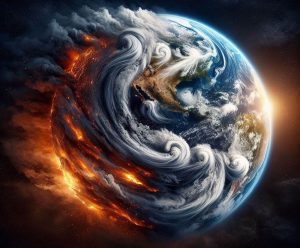Earth’s vital signs have reached unprecedented levels

 A recent report published by an international team of climate scientists offers a dire warning about the state of the Earth’s vital signs, saying they have deteriorated to levels unseen in human history.
A recent report published by an international team of climate scientists offers a dire warning about the state of the Earth’s vital signs, saying they have deteriorated to levels unseen in human history.
The report’s lead authors, William Ripple and Christopher Wolf, and 10 other scientists stress that urgent action is needed to address the root cause of environmental overload, which occurs when human demand for the Earth’s resources exceeds its ability to regenerate.
The report, published in the journal BioScience, highlights 20 of 35 planetary vital signs used to track climate change are currently at record extreme levels. The authors cite new data suggesting that numerous climate records will be broken in 2023, especially for ocean temperatures and sea ice. They also note unprecedented carbon emissions from Canada’s wildfire season.
The report is a follow-up to the Global Scientists’ Climate Emergency Warning, published four years ago, which was signed by more than 15,000 scientists from 161 countries. The report’s lead author, William Ripple, argues that life on our planet is under threat and warns of a possible collapse of natural and socio-economic systems unless urgent action is taken.
Key figures presented in the report include a doubling of fossil fuel subsidies between 2021 and 2022, reaching more than 1 trillion.
In addition, the Canadian wildfires in 2023 have already released more carbon dioxide into the atmosphere than all of Canada’s greenhouse gas emissions in 2021. The report also notes an alarming rise in average global temperatures above pre-industrial levels, with 38 days in 2023 expected to exceed the 1.5 degrees Celsius threshold.
The authors emphasize the need to develop policies that prioritize human well-being and address the overconsumption and excess emissions of the wealthy.
Their recommendations include phasing out fossil fuel subsidies, promoting plant-based diets, protecting forests and implementing international treaties to limit the use of fossil fuels.
The authors emphasize that climate action must be based on principles of equity and social justice, as the poorest people suffer disproportionately from climate impacts.
The report ends with a call to action, saying that scientists and institutions have a moral responsibility to disseminate climate facts and make policy recommendations. They argue that scientists must play a leading role in addressing existential threats and alerting humanity to the need for urgent change.



